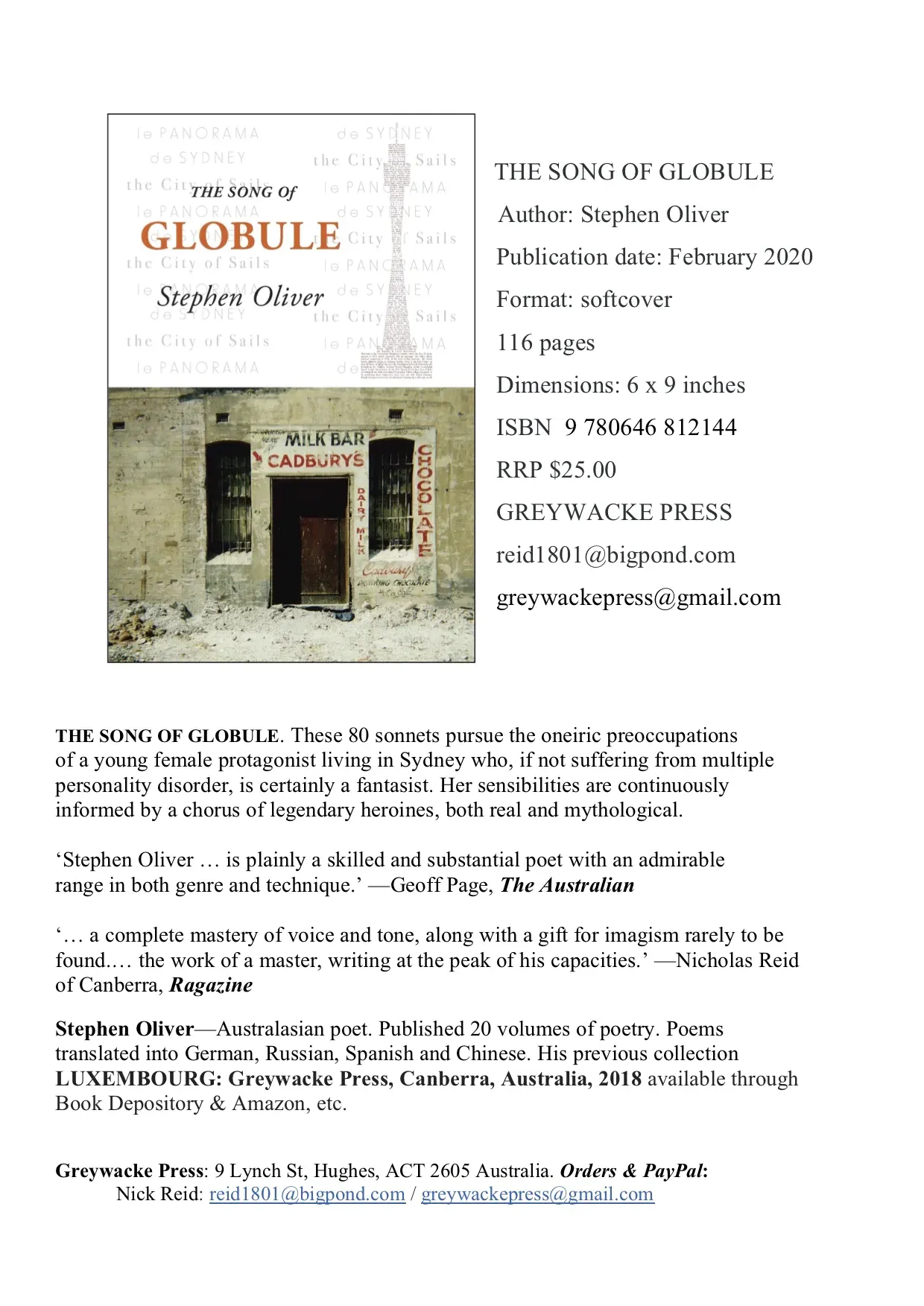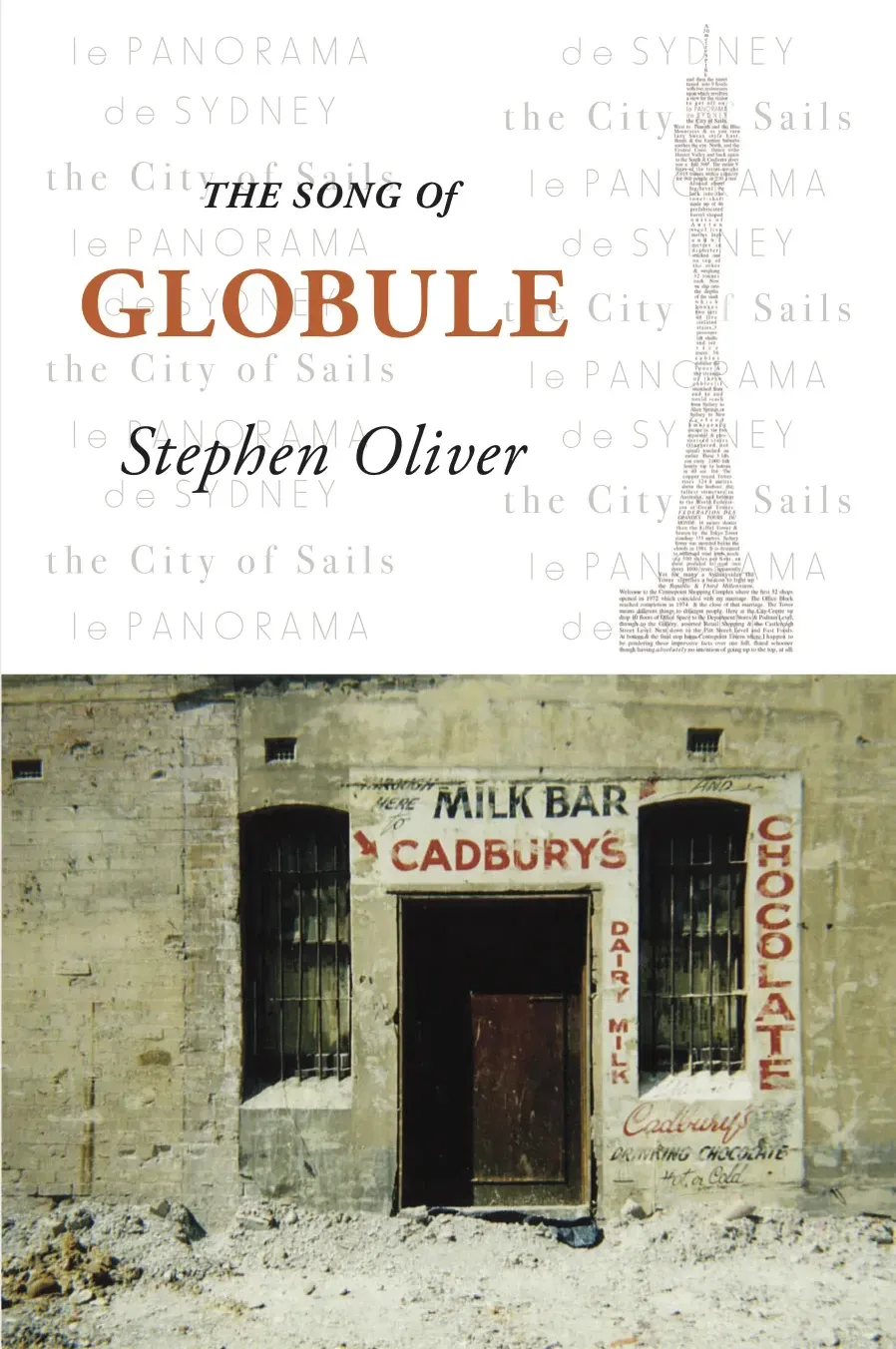THE SONG OF GLOBULE / 80 SONNETS, by Stephen Oliver, GREYWACKE PRESS, CANBERRA (2020)

‘Stephen Oliver … is plainly a skilled and substantial poet with an admirable range in both genre and technique.’—Geoff Page, The Australian
‘… a complete mastery of voice and tone, along with a gift for imagism rarely to be found.… the work of a master, writing at the peak of his capacities.’ —Nicholas Reid of Canberra, Ragazine
‘… a confident and skilled Stephen Oliver at the height of his powers, employing different techniques and using striking language and images. His poems take the reader on evocative and insightful external and internal journeys of people, place and, most important of all, imagination.’ – Earl Living —Plumwood Literary Journal
Greywacke Press: 9 Lynch St, Hughes, ACT 2605 Australia. Orders & PayPal: greywackepress@gmail.com
The Song of Globule. By Stephen Oliver. Greywacke Press. pp 97. $25
Reviewed by Geoff Page / The Australian, April 17 2021
In the biographical note for The Song of Globule Stephen Oliver quite reasonably—but quixotically—describes himself as an “Australasian” poet. His track record includes some twenty books published in both New Zealand and Australia over the decades and yet Oliver is not as well-known in our country as he deserves to be. Reviewers in both places may well assume he is better known in the other.
Oliver’s work in general varies considerably in tone and genre. He is probably one of the most accomplished satirists writing in either country. Conversely, Oliver’s work can also lyrical, sometimes in a satirical context and sometimes more purely.
His latest book, The Song of Globule, is set mainly in Sydney. Like many satirists, Oliver is more than half in love with the subject of his ridicule. Does he really mean it when he recommends: “Sydney girls, obsessed with real estate” / ensnare your man, get your house, renovate”
The butt of this jibe is a young Sydney girl, a shape-shifter, who in a way is as much mythological as she is human. It’s no surprise that Oliver’s account of her adventures concludes with fifteen sonnets roughly translated from Ovid’s Heroides
Oliver’s sixty-five other sonnets detail Globule’s adventures—from the loss of her virginity in sonnet 2 (“Back of a Ford, Brad popped her cherry—O/ Yay! to dumb girlhood she bid cheerio”) to sonnet 80 where, some years older and with metaphysical intimations, she decides “to strike out for the coast / travel north for a while, follow the rails.”
As the tone here suggests, the poet is more than a little besotted with his subject and, like her parents (“Her chartered accountant father (poor sod) / and her smiley, house-proud, aproned mother”) is prepared to indulge her. The book is hardly a sophisticated and layered interrogation of contemporary womanhood but Oliver’s blend of the lyrical and satirical will have most readers smiling along with him—if a tad guiltily at times.
This is also helped by the poet’s notable dexterity with his unusual sonnet form, an iambic pentameter stanza of twelve lines rhyming abccbadeffed with a gg stanza appended. The end of sonnet 9 is typical. “A bus to Bondi (the weather said fine)/ though first she must wax her bikini line.’ Whether Oliver with his beloved Globule will start a fashion for “Australasian” poetry remains to be seen but these eighty sonnets could be an entertaining beginning.
The Red Room Company